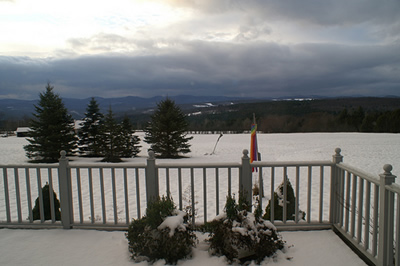
Beautiful and snowy at my parents' place for Thanksgiving, and yes, this is the view from their living room. The turkey was delicious, the stuffing bad for me, the candied yams so full of butter and sherry that I forgot they were originally tubers.
Of course, Thanksgiving now involves other traditions. This year, my brother and I helped take the lawnmower attachment off his sit-down lawnmower and put on the snowthrower. I'm slightly less handy than a one-armed man without thumbs, but I helped around the periphery.
We had good, traditional Thanksgiving. Much food, enjoyable conversation, and time with beloved family. It strikes me as so very strange that we have the quintessential Thanksgiving: New England, and family that can get together without screaming, sulking, of sniping. For this, and for the reasons behind it, I am extremely thankful.
If you'd like a window into my family's thanksgiving, my brother took many pictures, and posted them to his flickr site.